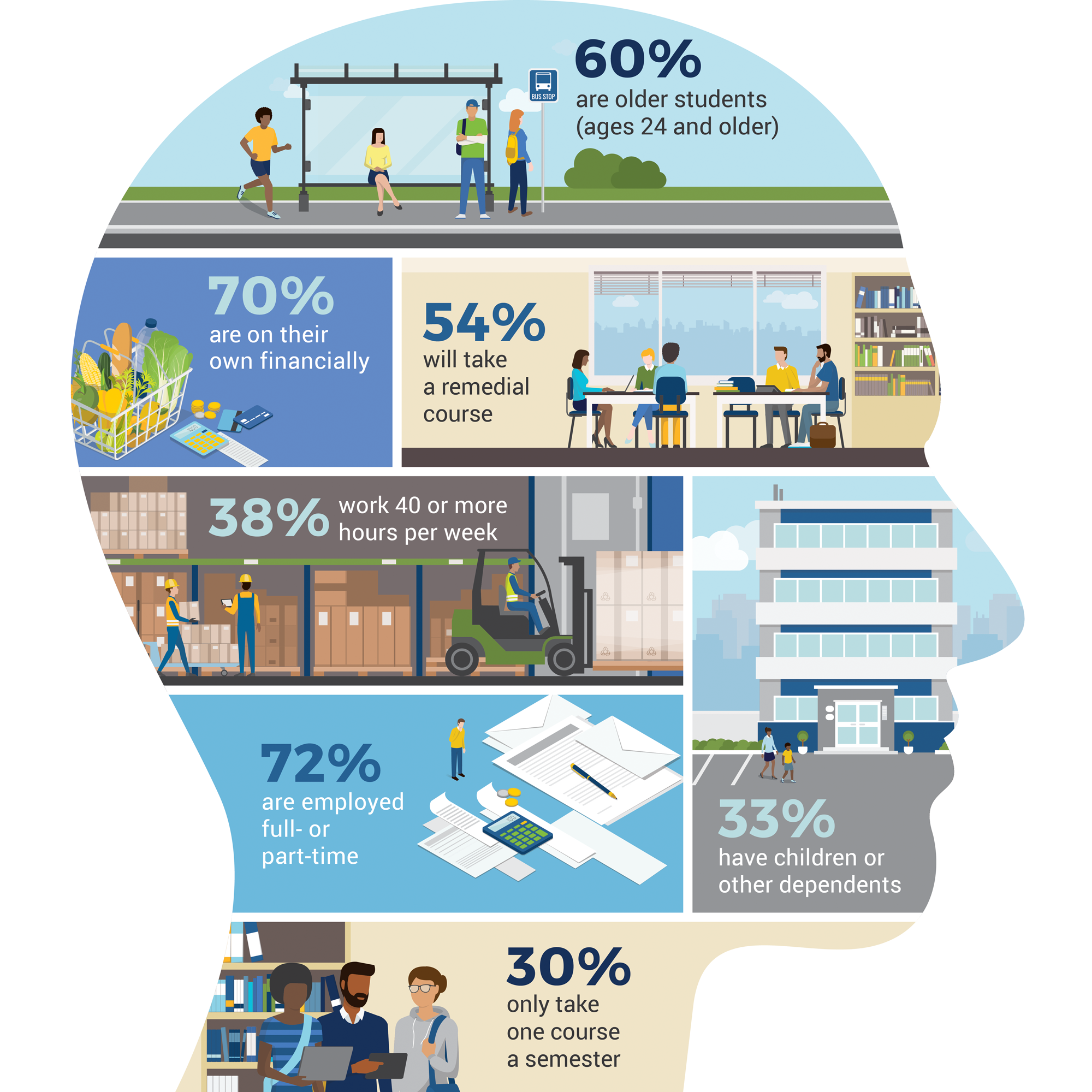Part-Time Students
Balancing Life & AcademicsThe Part-Time Student Experience
Maintaining Momentum from Enrollment to Graduation
A part-time student is a student who enrolls in fewer than twelve credit hours in a single academic term. Many of these students will only enroll in one or two courses each semester.1 As a result, it will take a part-time student significantly more time than a full-time student to earn enough credits to graduate with a degree or credential. Along the way, many part-time students will lose momentum and stop out or drop out before achieving their academic goals.
However, taking a smaller credit load is a necessity for many students. The average part-time student is attempting to balance academic pursuits with many other personal and professional responsibilities, such as full-time employment or caring for dependents. Moreover, many of these students are financially independent and grapple with how to finance their education and maintain eligibility for financial aid.1 Since part-time students make up a majority of NOVA’s student population, supporting students through these challenges will be critical to NOVA’s efforts to help every student succeed.
Nationwide NUMBERS
6.4 million
college students nationwide are enrolled part-time.2


59%
of part-time students are enrolled at a community college.3

80%
of community college students attend part-time for at least one semester.4
14%
of part-time students aged 24 and younger graduated within six years.5

4 in 10
27%
of part-time students aged 25 and older graduated within six years.5
Nationwide NUMBERS
6.4 million
college students nationwide are enrolled part-time.2

59%
of part-time students are enrolled at a community college.3

80%
of community college students attend part-time for at least one semester.4

14%
of part-time students aged 24 and younger graduated within six years.5

27%
of part-time students aged 25 and older graduated within six years.5
4 in 10
of first generation students who left college without a degree cited financial constraints as the reason1
4 in 10
Part-Time Students at NOVA
A majority of NOVA students enroll part-time at least once while pursuing a degree or credential. Understanding the characteristics of this large population of students will be critical to NOVA’s efforts to help every student succeed.7

Always Full-Time: Enrolled full-time every semester over a four-year period

Always Part-Time: Enrolled part-time every semester over a four-year period

Fluid Enrollment: Alternated between full- and part-time enrollment over a four-year period
Enrollment
Many students will enroll full-time during their first semester at NOVA. However, over a four-year period, over two-thirds of these students will take a part-time credit load for at least one semester.
First Semester Enrollment

Enrollment Over Four Years

Average Credits
Attempted and Earned
Four-Year Graduation
and Transfer Rate
Not only do part-time students enroll in fewer courses each semester, but a larger proportion of their credit attempts are unproductive.

Average Credits Earned

Unprodcutive Credits

Total Credits Attempted

Relative to full-time students, only a small percentage of part-time students will graduate and/or transfer within four years of initial enrollment.

Part-Time Students at NOVA
A majority of NOVA students enroll part-time at least once while pursuing a degree or credential. Understanding the characteristics of this large population of students will be critical to NOVA’s efforts to help every student succeed.7

Always Full-Time: Enrolled full-time every semester over a four-year period

Always Part-Time: Enrolled part-time every semester over a four-year period

Fluid Enrollment: Alternated between full- and part-time enrollment over a four-year period
Enrollment
Many students will enroll full-time during their first semester at NOVA. However, over a four-year period, over two-thirds of these students will take a part-time credit load for at least one semester.
First Semester Enrollment

Enrollment Over Four Years

Average Credits
Attempted and Earned
Not only do part-time students enroll in fewer courses each semester, but a larger proportion of their credit attempts are unproductive.

Average Credits Earned

Unprodcutive Credits

Total Credits Attempted

Four-Year Graduation
and Transfer Rate
Relative to full-time students, only a small percentage of part-time students will graduate and/or transfer within four years of initial enrollment.

The NOVA Part-Time Student Perspective
Part-time students at NOVA describe a variety of successes and challenges they have encountered while pursuing an academic degree or credential.8




“Sometimes it can be difficult juggling work and being a college student in such a competitive program.”
“My experience as a part-time student at NOVA has been wonderful. I love the flexible schedules, and I have taken morning, evening, and ELI courses.”
“My experience as a part-time student has been very gratifying. As a full-time professional with a family, I wasn’t sure if I would be able to add one more thing to my list of duties.”
“Being a parent to a four-year-old, while going back to school and working, is very challenging.”
The NOVA Part-Time Student Perspective
Part-time students at NOVA describe a variety of successes and challenges they have encountered while pursuing an academic degree or credential.8


“Sometimes it can be difficult juggling work and being a college student in such a competitive program.”
“My experience as a part-time student at NOVA has been wonderful. I love the flexible schedules, and I have taken morning, evening, and ELI courses.”


“My experience as a part-time student has been very gratifying. As a full-time professional with a family, I wasn’t sure if I would be able to add one more thing to my list of duties.”
“Being a parent to a four-year-old, while going back to school and working, is very challenging.”
The NOVA Part-Time Student Perspective
Part-time students at NOVA describe a variety of successes and challenges they have encountered while pursuing an academic degree or credential.8

“Sometimes it can be difficult juggling work and being a college student in such a competitive program.”

“My experience as a part-time student at NOVA has been wonderful. I love the flexible schedules, and I have taken morning, evening, and ELI courses.”

“My experience as a part-time student has been very gratifying. As a full-time professional with a family, I wasn’t sure if I would be able to add one more thing to my list of duties.”

“Being a parent to a four-year-old, while going back to school and working, is very challenging.”














